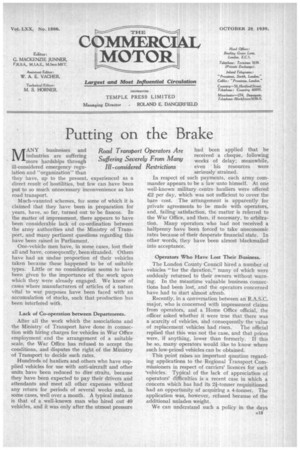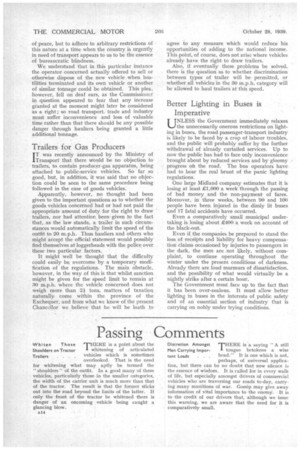Putting on the Brake
Page 15

Page 16

If you've noticed an error in this article please click here to report it so we can fix it.
ANY businesses and industries are suffering more hardships through ill-considered emergency regulation and "organization" than they have, up to the present, experienced as a direct result of hostilities, but few can have been put to so much unnecessary inconvenience as has road transport.
Much-vaunted schemes, for some of which it is claimed that they have been in preparation for years, have, so far, turned out to be fiascos. In the matter of impressment, there appears to have been considerable lack of co-ordination between the army authorities and the Ministry of Transport, and many pertinent questions regarding this have been raised in Parliament.
One-vehicle men have, in some cases, lost their all and have, consequently, been stranded. Others have had an undue proportion of their vehicles taken because these happened to be of suitable types. Little or no consideration seems to have been given to the importance of the work upon which they were already engaged. We know of cases where manufacturers of articles of a nature vital to war purposes have been faced with an accumulation of stocks, such that production has been interfered with.
Lack of Co-operation between Departments.
After all the work which the associations and the Ministry of Transport have done in connection with hiring charges for vehicles in War Office employment and the arrangement of a suitable scale, the War Office has refused to accept the conditions, and disputes the right of the Ministry of Transport to decide such rates.
Hundreds of hauliers and others who have supplied vehicles for use with anti-aircraft and other units have been reduced to dire straits, because they have been expected to pay their drivers and attendants and meet all other expenses without any return for periods of several weeks and, in some cases, well over a month. A typical instance is that of a well-known man who hired out 40 vehicles, and it was only after the utmost pressure had been applied that he received a cheque, following weeks of delay; meanwhile, even his resources were seriously strained.
In respect of such payments, each army commander appears to be a law unto himself. At one well-known military centre hauliers were offered 42 per day, which was not sufficient to cover the bare cost. The arrangement is apparently for private agreements to be made with operators, and, failing satisfaction, the matter is referred to the War Office, and then, if necessary, to arbitration. Many operators who had not received a halfpenny have been forced to take uneconomic rates because of their desperate financial state. In other words, they have been almost blackmailed into acceptance.
Operators Who Have Lost Their Business.
The London County Council hired a number of vehicles "for the duration," many of which were suddenly returned to their owners without warning. In the meantime valuable business connections had been lost, and the operators concerned have had to start almost afresh.
Recently, in a conversation between an R.A.S.C. major, who is concerned with impressment claims from operators, and a Home Office official, the officer asked whether it were true that there was a scarcity of vehicles, and consequently the value of replacement vehicles had risen. The official replied that this was not the case, and that prices were, if anything, lower than formerly. If this be so, many operators would like to know where such low-priced vehicles can be obtained.
This point raises an important question regarding applications to the Regional Transport Commissioners in respect of carriers' lkences for such 'vehicles. Typical of the lack of appreciation of operators' difficulties is a recent case in which a concern which has had its 2i-tonner requisitioned had an opportunity of acquiring a 4-tormer. The application was, however, refused because of the additional unladen weight.
We can understand such a policy in the days of peace, but to adhere to arbitrary restrictions of this nature at a time when the country is urgently in need of transport appears to us to be the essence of bureaucratic blindness. We understand that in this particular instance the operator concerned actually offered to sell or otherwise dispose of the new vehicle when hostilities terminated and its own vehicle or another of similar tonnage could be obtained. This plea, however, fell on deaf ears, as the Commissioner in question appeared to fear that any increase granted at the moment might later be considered as a right; so road transport. trade and industry must suffer inconvenience .and loss of valuable time rather than that there should be any possible danger through hauliers being granted a little additional tonnage.
Trailers for Gas Producers LT was recently announced by the Ministry of Transport that there would be no objection to trailers, to contain producer-gas apparatus, being attached to public-service vehicles. So far so good, but, in addition, it was said that no objection could be seen to the same procedure being followed in the case of goods vehicles. Apparently, however, no thought had been given to the important questions as to whether the goods vehicles concerned had or had not paid the appropriate amount of duty for the right to draw trailers, nor had attention been given to the fact that, as the law stands, a trailer in such circumstances would automatically limit the speed of the outfit to 20 m.p.h. Thus hauliers and others who might accept the official statement would possibly find themselves at loggerheads with the police over these two particular factors. It might well be thought that the difficulty could easily be overcome by a temporary modification of the regulations. The main obstacle, however, in the way of this is that whilst sanction might be given for the speed limit to remain at 30 m.p.h. where the vehicle concerned does not weigh more than 21tons, matters of taxation naturally come within the province of the Exchequer, and from what we know of the present Chancellor we believe that he will be loath to agree to any measure which would reduce his opportunities of adding to the national income. This point, of course, does not arise where vehicles already have the right to draw trailers. Also, if eventually these problems be solved, there is the question as to whether discrimination between types of trailer will be permitted, or whether all vehicles in the 30 m.p.h. category will be allowed to haul trailers at this speed.
Better Lighting in Buses is Imperative TNLESS the Government immediately relaxes the unnecessarily onerous restrictions on lighting in buses, the road passenger-transport industry is likely to be faced by. a crop of labour troubles, and the public will probably suffer by the further withdrawal of already curtailed services. Up to now the public has had to face only inconvenience brought about by reduced services and by gloomy progress oh the road. The bus operators have had to bear the real brunt of the panic lighting regulations. One large Midland company estimates that it is losing at least £1,000 a week through the passing of bad money and the non-payment of fares. Moreover, in three weeks, between 90 and 100 people have been injured in the dimly lit buses and 17 fatal accidents have occurred. Even a comparatively small municipal undertaking is losing about £400 a week on account of the black-out. Even if the companies be prepared to stand the loss of receipts and liability for heavy compensation claims occasioned by injuries to passengers in the dark, the men are not likely, without cornplaint, to continue operating throughout the winter under the present conditions of darkness. Already there are loud murmurs of dissatisfaction, and the possibility of what would virtually be a nightly strike after a certain hour. The Government must face up to the fact that it has been over-zealous. It must allow better lighting in buses in the interests of public safety and of an essential section of industry that is carrying on nobly under trying conditions.






























































